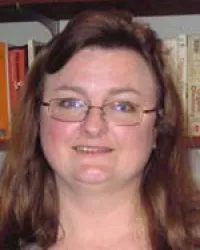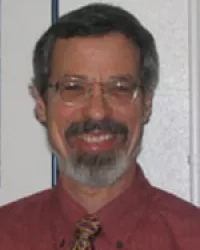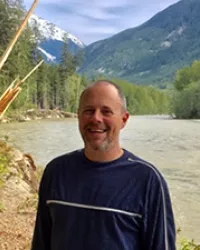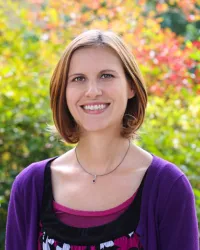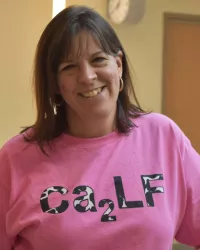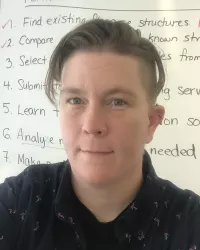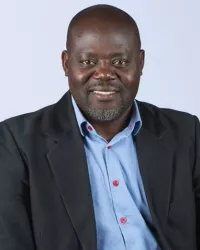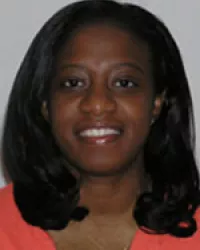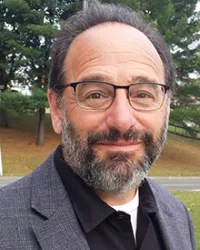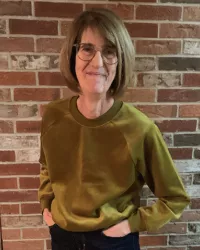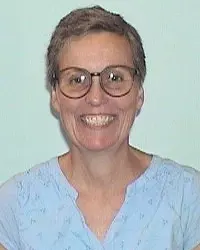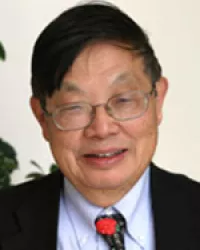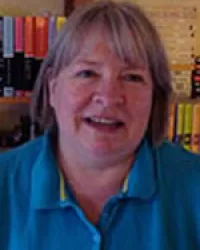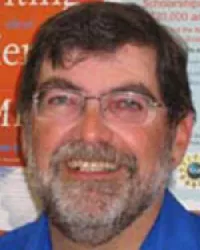Welcome to your Chemistry and Biochemistry home at SUNY Oneonta! Our faculty members are diverse in several ways – by areas of expertise, ethnicity, age and gender – but we are fully united in our commitment to share with students our immense collective knowledge, skills and passion for science.
Full-Time Faculty
Dr. Jacqueline Bennett, Professor
Jacqueline.Bennett@oneonta.edu
232 Physical Science Building
607-436-3431
Teaching Specialization: Organic Chemistry
B.S. in Chemistry and B.A. in Biology (1992): West Virginia University
M.S. (1994) and Ph.D. (1999) in Chemistry: the University of California, Riverside
Research Interests: Dr. Bennett's research interests lie in green chemistry, inquiry-based learning, and the use of technology to enhance student learning. Her most important interest, however, is mentoring future scientists in her research group. She recently won a national award from the American Chemical Society Committee on Environmental Improvement in recognition of a green, inquiry-based experiment she designed for organic chemistry laboratory. She was awarded a patent for this innovative procedure.
Dr. Bennett's research group is called the BLONDES: Building a Legacy of Outstanding New Developments and Excellence in Science. One of her research students, Michelle Linder, won an international green chemistry award in 2011 for research she did under Dr. Bennett's supervision. Michelle was the first undergraduate to ever win the award-all others were Ph.D. students or post-doctoral associates. Several of her students have received national recognition by being selected to participate in a National Science Foundation Research Experience for Undergraduates during summers in New York, Connecticut, Michigan, Utah, and Turkey. All eight of her Spring 2011 research students were formally recognized by SUNY Oneonta for research excellence.
Dr. Bennett has current funding from the National Science Foundation for a project designed to introduce computational chemistry to the university's chemistry courses via a graduated approach. She has previous funding through a Dreyfus Foundation grant to research green photochemistry.
Dr. Ronald Bishop, Associate Professor & Department Chair
Ron.Bishop@oneonta.edu
228 Physical Science Building
607-436-3198
A.B. in Chemistry: Youngstown State University (1981)
Ph.D. in Biochemistry: West Virginia University School of Medicine (1990)
CHO, National Registry of Certified Chemists (2009)
Courses Taught: General Chemistry I & II, Essential Organic Chemistry, Organic Chemistry I & II, General Biochemistry,
Biochemistry I & II, Essential Polymer Chemistry, Senior Seminar
Research Interests: Dr. bishop leads research in two distinct areas: petroleum industry operations and medicinal chemistry of stimulus-triggered (nociceptive) pain. Regarding petroleum industry operations, his team investigates interactions between oil and gas production chemicals and compounds already present in petroleum source rocks. Recently, they discovered that reactions occurring after hydraulic fracturing produce undesirable by-products including formaldehyde. With respect to nociceptive pain, his team is synthesizing novel merocyanine molecules designed to antagonize the TRPV1 (vanilloid) neuronal receptor. For all these studies, they utilize a wide range of computational, organic synthesis, purification, biochemical and analytical techniques.
Community Service: Education and activism related to large-scale extraction of natural gas from unconventional reserves in New York State.
Other Interests: Music (vocal and guitar), outdoor recreation, fiction writing.
Dr. Antoine Blanc, Associate Professor
Antoine.Blanc@oneonta.edu
205 Physical Science Building
607-436-3482
Teaching Specialization: Biochemistry
B.Sc. in Biochemistry: University of Montreal, Montreal, QC, Canada
M.Sc. in Biomedical Sciences: University of Montreal, QC, Canada
M.Sc. in Chemistry: University of British Columbia, BC, Canada
Ph.D. in Chemistry: University of British Columbia, BC, Canada
Dr. Antoine Blanc received a B.Sc. in Biochemistry and a M.Sc. in Biomedical Sciences from the University of Montreal. He subsequently worked as a Research Associate in the Cartilage Tissue Engineering laboratory, Polytechnic School of Montreal (Montreal, QC, Canada), followed by completing a MSc and Ph.D. in Chemistry at the University of British Columbia. In Fall 2018 Dr. Blanc joined the Department of Chemistry & Biochemistry at SUNY Oneonta as a tenure-track assistant professor of biochemistry.
Research Interests: Dr. Blanc's research interests are in the area of Chemical Biology and Green Chemistry, to gain insight into biological problems at a mechanistic level using chemical and biological tools. Dr. Blanc's research incorporates the disciplines of organic chemistry, biochemistry, cell biology and pharmacology. Chemicals made in laboratory include small biomolecules, such as peptides and non-natural peptides, as well as non-natural probe and potential medicinal compounds. The interdisciplinary nature of Dr. Blanc's research welcomes students with diverse interests in science. The biologist-oriented students will realize the power of building molecules and using chemical concepts to answer biological questions. The chemist-oriented students will gain motivation and interest in tackling the inherent synthetic challenges of creating novel biological active compounds to treat illness or to probe biological phenomenon.
Dr. Kimberly Cossey, Assistant Professor
kimberly.cossey@oneonta.edu
202 Physical Science Building
607-436-3481
Dr. Kimberly Cossey earned a Ph. D. from the Pennsylvania State University. Since then, she has been spreading her love of Organic Chemistry to students in both Georgia and Indiana. Developing teaching materials that engage students and help them through challenging courses is her passion. She joined the Department of Chemistry and Biochemistry at SUNY Oneonta in the Fall of 2020.
Dr. Cossey's research interests center around using chemistry to serve society. Projects include designing and optimizing chemical reactions for future lab courses, and community-based research projects. While new community-based projects will be tied to the areas around Oneonta, previous community projects have included: determining the amount of caffeine in coffee for a local coffeeshop, and checking well water for heavy metals for communities with known arsenic problems.
Dr. Cossey is excited to join the Chemistry and Biochemistry faculty and staff at SUNY Oneonta and is excited to start contributing to the success of our students. She made the move to New York with her husband, Luke, and two young daughters. In her free time, she enjoys music (especially singing), playing video games, reading novels, watching movies, and game nights.
Dr. Kelly Ryan Gallagher, Professor
Kelly.Gallagher@oneonta.edu
227 Physical Science Building
607-436-3180
Courses Taught: Introductory Chemistry, General Chemistry, Biochemistry, Computational Chemistry, Senior Undergraduate Seminar, Molecular Virology, Genetically Engineered Machines
B.S. in Biochemistry, Boston College
Ph.D. in Biochemistry and Molecular Biophysics, University of Pennsylvania
Faculty Web Page
After earning her undergraduate degree in Biochemistry, Dr. Gallagher worked in the biotechnology industry in the areas of biopharmaceutical processing, HIV vaccine research, and the development of tools to facilitate drug development for inflammatory diseases. She left industry to pursue graduate work in the field of computational biophysics at the University of Pennsylvania, where she developed models to enhance our understanding of the interaction of biological molecules with their environment for use in rational drug development.
Since joining the faculty at Oneonta in 2007, her interests have ranged from public science outreach (she served as the Assistant Director of the AJ Read Science Discovery Center from 2003-2017), to the use of computational tools in chemical education, to researching biological molecules involved in protein degradation and viral infection, to the emerging field of synthetic biology. She is the co-founder with Dr. Jill Fielhaber (Biology) of the SUNY Oneonta international genetically engineered machine (iGEM) team. To learn more about the iGEM program at Oneonta, visit the SUNY Oneonta iGEM website.
Dr. Angela N. Migues, Assistant Professor
Angela.Migues@oneonta.edu
226 Physical Science Building
607-436-3432
B.S., Chemistry, University of North Florida
Ph.D., Chemistry, University of Massachusetts-Amherst
Courses taught: General Chemistry I & II; Physical Chemistry II
Dr. Migues earned a B.S. in chemistry with a minor in mathematical science from the University of North Florida and a Ph.D. in chemistry from the University of Massachusetts, Amherst. As an undergraduate, she used electronic structure methods to study the relationship between protein dynamics and competitive, intermolecular hydrogen bonding in Streptococcal Hyaluronate Lyase. During her Ph.D., she studied mixed aldol condensations of biomass-derived aldehydes in acidic zeolites to determine the kinetics of carbon bond formation, a process critical for upgrading smaller molecular fragments into usable biofuels. After her Ph.D., Dr. Migues was awarded a National Institutes of Health Institutional Research and Career Development Award (IRACDA) to pursue postdoctoral studies at Stony Brook University. While at Stony Brook, she used molecular mechanics to study DNA replication and repair mechanisms, and also worked on developing a physics based force field for biological molecules that incorporates quantum mechanical energy corrections to describe non-bonded interactions in proteins. Currently, Dr. Migues is an Assistant Professor at SUNY Oneonta. At SUNY Oneonta, her research employs computational chemistry to probe elements of chemical and biological systems that are inaccessible to experiment. Her research interests include material science, catalysis, protein-dna interactions, protein structure and function, as well as method development to study such systems.
Dr. Maurice O. Odago, Associate Professor
Maurice.Odago@oneonta.edu
229 Physical Science Building
607-436-3480
B.Ed Science Chemistry and Math, Egerton University, Kenya (2000)
Ph.D. in Organic and Inorganic Chemistry: State University of New York at Binghamton (2010)
Courses Taught: General Chemistry I & II, Descriptive Inorganic Chemistry, Elementary Organic Chemistry, and Organic Chemistry I & II.
Dr. Odago started his teaching career in Kenya, where he taught chemistry and math in high school for 3 years before joining the graduate school at SUNY Binghamton. While in graduate school, he served as a head-teaching assistant and as an instructor of record for many chemistry courses. Dr. Odago was the recipient of the Graduate Student University's Award for Excellence in Teaching Chemistry (2007). He also served as a tutor for the Trio program at Binghamton University and as an instructor of chemistry at SUNY-Broome Community College.
He joined the Department of Chemistry & Biochemistry at SUNY Oneonta in the fall of 2010 as a lecturer for two years and in the fall of 2012, he has begun a tenure-track appointment as an assistant professor of organic chemistry in the same department.
Research Interests: Dr. Odago's research interests are in the area of organometallic and supramolecular chemistry, especially the design and synthesis of luminescent organometallic complexes for anion sensing. He is also interested in the design and synthesis of new chiral N-heterocyclic carbene ligands for homogeneous asymmetric catalysis and possible electrochemical anion "host-guest" molecular recognition.
Other Interests: Gardening, hiking, traveling and playing soccer
Dr. Trudy E. Thomas-Smith, Associate Professor
Trudy.Thomas-Smith@oneonta.edu
231 Physical Science Building
607-436-3179
Teaching Specialties: Analytical Chemistry, General Chemistry
B.Sc., University of the West Indies, Mona, Jamaica
Ph.D., Analytical/Environmental Chemistry, University of Maryland,
College Park, 2001
Dr. Thomas-Smith earned her Ph.D. in Analytical/Environmental Chemistry at the University of Maryland College Park. Since joining the department she has taught the Analytical Chemistry Course Sequence: CHEM 361 and CHEM 362, the General Chemistry Course Sequence: CHEM 111 and CHEM 112, a special topics course in Electrochemistry and the seminar course Discussions in Chemistry.
Dr. Thomas-Smith’s research interests fall into three categories. They are (1) basic Analytical Chemistry in which portable analytical instruments are designed, constructed and tested; (2) Environmental Chemistry in which the concentration and fate of emerging contaminants originating from personal care products and pharmaceuticals in natural waters are determined; and (3) History of Science which involves the examination of the role of Black, African American and other Scientists from ethnic minority groups in the scientific enterprise and societal recognition of that role.
In addition to teaching and research, Dr. Thomas-Smith is particularly interested in fostering an inclusive campus climate and serves on several committees such as GAIN (Graduation Advocacy Information Network), a committee aimed at ensuring (particularly AALANA) student retention and graduation. Dr. Thomas-Smith also likes to keep up with and discuss Chemistry in Industry: particularly the pharmaceutical industry and to help our majors explore potential opportunities in preparation for graduation.
Other Research Interests:
- Environmental Chemistry of Natural Waters - Exploring the role of natural water constituents in the fate of chemicals from anthropogenic (man-made) sources.
- Industrial Analytical Chemistry - Evaluating modifications of current industry practices in pharmaceutical analysis, so as to reduce hazardous liquid waste.
Interests other than chemistry and education: Reading psychological thrillers, houseplants, travel, spending time with her husband and two sons.
Dr. William J. (Bill) Vining, Professor
William.Vining@oneonta.edu
249A Physical Science Building
607-436-2698
Teaching Specialties: General (freshman) Chemistry; Inorganic Chemistry
B.S., Chemistry, SUNY Oneonta
Ph.D., Inorganic Chemistry, University of North Carolina, Chapel Hill
Employee Webpage
Dr. Bill Vining graduated SUNY Oneonta in 1981. He earned his Ph.D. in inorganic chemistry at UNC-Chapel Hill in 1985 and worked several years in the industry as a "laundry scientist" at Johnson Wax. Dr. Vining returned to Oneonta in 1988 as an assistant professor at Hartwick College. In 1996, he moved on to UMass Amherst and directed their General Chemistry program, which serves 1400 students every semester. He was awarded the University of Massachusetts Distinguished Teaching Award in 1999, and the UMass College of Natural Sciences Outstanding Teacher Award in 2003. At UMass, he also ran a research group dedicated to developing interactive educational software, which included 15 professionals, graduate students, undergraduates, post-doctoral students, programmers, and artists. 100,000 chemistry students a year across the country now use the OWL interactive electronic homework system, authored by Dr. Vining and his UMass collaborators.
In 2005, Bill Vining came back "home" to his alma mater SUNY Oneonta. He thoroughly enjoys the high level of personal interaction possible with students and faculty in a small-to-medium department like ours. Dr. Vining's students have opportunities to undertake independent study projects under his guidance. And he continues his research efforts to incorporate the latest innovations in computer technology to create superior methods of chemistry education.
Cody Webb, Associate Professor
Cody.Webb@oneonta.edu
201 Physical Science Building
607-436-3465
Part-Time Faculty
KelLee Minor, Lab Instructor
KelLee.Minor@oneonta.edu
224 Physical Science Building
607-436-3342
Department Staff
Carol Conroe, Administrative Assistant I
carol.conroe@oneonta.edu
249 Physical Science Building
607-436-3193
Lisa Kastanis, Inventory Control Manager & Lecturer
Lisa.Kastanis@oneonta.edu
203 Physical Science Building
607-436-3433
Armond Minor, Instructional Support Technician
armond.minor@oneonta.edu
230 Physical Science Building
607-436-2604
Emeritus Faculty
Joseph Chiang
After more than 50 years of service to the campus community, Dr. Chiang retired in 2019. His illustrious career included visiting professorships in Chicago, Peking, Tsinghua, Shanghai and Beijing Universities and authoring more than 49 publications.
Dr. Heike Geisler, Associate Professor
Teaching Specialization: Physical Chemistry
Diploma in Physical Chemistry (M.S.), Ruhr University Bochum, Germany
Dr. rer. nat. in Physical Chemistry (Ph.D.), Ruhr University Bochum, Germany
Dr. Geisler joined SUNY Oneonta in 2012. She was previously an Assistant Professor in the Chemistry Department at the Xavier University of Louisiana, where she taught Physical Chemistry and General Chemistry classes. She has also taught in the Chemistry Department at Texas State University and the Physics Department at the University of New Orleans as a Lecturer.
Her research interests are in the field of Surface Science. Topics of interest are catalytic processes at surfaces, the formation of self-assembled monolayers (SAMs) on single crystal surfaces, and the growth of two-dimensional crystals such as graphene on transition metal substrates. Experimental techniques used in her research include low energy electron diffraction (LEED), electron energy loss spectroscopy (EELS), temperature programmed desorption (TPD), and synchrotron-based angle-resolved ultra-violet photoelectron spectroscopy (ARUPS). She is an adjunct faculty at the College of Nanoscale Science and Engineering (CNSE) in Albany. In her spare time, Dr. Geisler is an avid mystery reader and enjoys fiber arts.
Dr. Allan Green, Professor
Teaching Specialization: Biochemistry
Courses taught: Intro Biochem, Biochem II, Biochem in Health & Disease
BSc, Biology, University of East Anglia, Norwich, England
D.Phil., Biochemistry, University of Oxford, England
Dr. Green has previously been a professor at medical schools in Florida and Texas, and Director of a research institute. His background is in biochemistry, endocrinology, and pharmacology. Dr. Green's research is focused on studies of obesity and type 2 diabetes. He has published more than 130 papers and abstracts on his research, which mostly concerns regulation of fat cell metabolism and the relationship between excess body fat, insulin resistance and risk of diabetes.
Dr. Green joined the department full time in 2010. He enjoys involving students in his research on fat cell metabolism, but now spends much of his time teaching biochemistry.
Contact the Chemistry & Biochemistry Department
249 Physical Science
108 Ravine Parkway
Oneonta, NY 13820
United States
